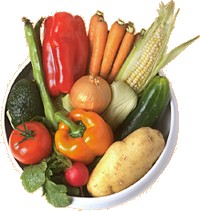 After a Bible study on the book of Daniel, I had a conversation with a friend that stirred me to speak deeply about my convictions regarding my vegetarianism. Even though Daniel’s temporary faithfulness to a plant-based diet was, of course, an act of obedience to God, I also believe that choosing a vegetarian lifestyle today remains a way to embrace God’s original intention for humanity, while receiving both spiritual and practical blessings.
After a Bible study on the book of Daniel, I had a conversation with a friend that stirred me to speak deeply about my convictions regarding my vegetarianism. Even though Daniel’s temporary faithfulness to a plant-based diet was, of course, an act of obedience to God, I also believe that choosing a vegetarian lifestyle today remains a way to embrace God’s original intention for humanity, while receiving both spiritual and practical blessings.From the very beginning, Scripture reveals God’s vision for humanity to live in harmony with creation. In Genesis, before the Fall, God designed a world overflowing with love, abundance, and beauty. In that world of perfection, He provided humanity with fruits and vegetables for nourishment (Genesis 1:29). This was part of His perfect plan—a plan marked by compassion and life, not by death.
In contrast, living in our fallen world today, it is difficult to shut our eyes to the harsh realities of modern slaughterhouses. The suffering of creatures—designed by God to flourish and enjoy life—mirrors the brokenness of creation itself. We may try to ignore it, but the unsettling truth remains: animals are sacrificed, often under horrifying conditions, for pleasures that are far from essential. Reflecting on this can be sobering.
Yet here is the hopeful truth: by choosing a vegetarian life, we have the opportunity to resist that brokenness. We can step away from unnecessary cruelty and align our daily choices with compassion and stewardship—values that echo God’s original design. In doing so, we affirm not only His vision for creation but also His call for us to mirror His goodness in the way we live.
The blessings of this choice reach beyond the spiritual. Countless studies show that a plant-based life often comes with physical health benefits and mental peace. Our bodies thrive on wholesome foods from the earth, and our consciences rest easier knowing we are not contributing to needless suffering.
To be clear, I do not believe Scripture condemns the eating of meat. In Acts 10:11–13, God makes it evident that eating meat is permitted. It remains a matter of personal conviction and freedom. But for me, living as a vegetarian or rather vegan has become both a gift and a calling: a way to honor God’s compassionate design, to strengthen my body, and to embrace a more mindful, life-affirming path.
“The Lord is good to all,
and his compassion is over all
that he has made.”
Psalm 145:9
